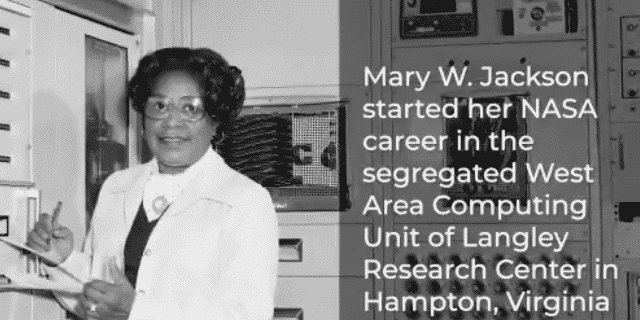NASA Administrator Jim Bridenstine announced the agency’s Washington, D.C., headquarters will be named after Mary W. Jackson, NASA’s first Black female engineer.
Bridenstine released an official statement on Wednesday confirming the commemorative gesture as he offered details about Jackson’s contributions to the agency and American history.
“Today, we proudly announce the Mary W. Jackson NASA Headquarters building,” Bridenstine said.
Our headquarters building in Washington, D.C., will be named after Mary W. Jackson, the first African-American female engineer at NASA. She started in @NASAaero research and later moved into the personnel field, working to ensure equal opportunity in hiring and promotion. pic.twitter.com/eMandeaMyv
— NASA (@NASA) June 24, 2020
In the press release, Bridenstine wrote, “Mary W. Jackson was part of a group of very important women who helped NASA succeed in getting American astronauts into space.”
Despite ongoing challenges both socially and professionally, Bridenstine noted, “Mary never accepted the status quo, she helped break barriers and open opportunities for African Americans and women in the field of engineering and technology.”
Noting that the NASA headquarters “appropriately sits on ‘Hidden Figures Way,'” Bridenstine insisted that the building name is “a reminder that Mary is one of many incredible and talented professionals in NASA’s history who contributed to this agency’s success.”
Many have taken to Twitter shared their reactions lauding NASA for its decision to honor Jackson’s legacy.
This is such exciting news. Mary W. Jackson was such an influential woman in NASA's history & helped break barriers and open opportunities for African Americans and women in the field of engineering and technology. I'm so happy that we're honoring the legacy of this trailblazer. https://t.co/IonnN3t6Uj
— Thomas Zurbuchen (@Dr_ThomasZ) June 24, 2020
Dr. Mae Jemison and Christina Koch, both female astronauts also tweeted their reactions.
Jemison tweeted, “Extremely pleased by the news that #NASA HQ in Washington DC will be named after Mary W. Jackson, the first African American woman engineer at NASA!”
Extremely pleased by the news that #NASA HQ in Washington DC will be named after Mary W. Jackson, the first African American woman engineer at NASA! https://t.co/zuDXXgwm8G. #MaryJackson #hiddenfigures2020
— Dr. Mae Jemison (@maejemison) June 24, 2020
Jemison also applauded Bridenstine for his leadership tweeting, “I applause your leadership and insight. Engineering, building dreams into reality, innovation, and daring the what may be believed impossible are defined by Mary W. Jackson and at the heart of NASA!”
I applause your leadership and insight. Engineering, building dreams into reality, innovation and daring the what may be believed impossible are defined by Mary W. Jackson and at the heart of NASA!
— Dr. Mae Jemison (@maejemison) June 24, 2020
Koch also echoed similar sentiments as she tweeted, “So excited to hear about this! Mary Jackson broke through barriers and became a hero to so many, including me. NASA was lucky to have her on the team then and will continue to draw from her strength and skills as her legacy inspires and educates into the future.”
So excited to hear about this! Mary Jackson broke through barriers and became a hero to so many, including me. NASA was lucky to have her on the team then and will continue to draw from her strength and skills as her legacy inspires and educates into the future. https://t.co/0K97wt9KX1
— Christina H Koch (@Astro_Christina) June 24, 2020
Jackson’s family has also released a statement in response to NASA’s latest press release.
“We are honored that NASA continues to celebrate the legacy of our mother and grandmother Mary W. Jackson,” said, Carolyn Lewis, Mary’s daughter. “She was a scientist, humanitarian, wife, mother, and trailblazer who paved the way for thousands of others to succeed, not only at NASA, but throughout this nation.”
Bridenstine proclaimed that Jackson would be “hidden no more” as he vowed that NASA would “continue to recognize the contributions of women, African Americans, and people of all backgrounds who have made NASA’s successful history of exploration possible.”























